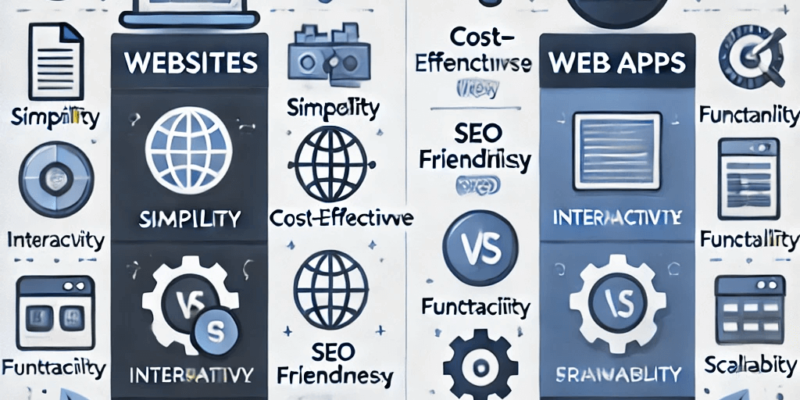
The digital landscape offers numerous options for businesses looking to establish an online presence. Among these options, two prominent choices stand out: Website vs Web App. Each serves unique purposes and offers distinct advantages. Understanding the differences between them is crucial for making an informed decision that aligns with your business goals.
Defining Websites and Web Apps
A website is essentially a collection of interconnected web pages, usually with a static nature, designed to provide information to visitors. It can include multimedia content, text, and interactive elements such as forms or buttons. Websites are typically used for content presentation, information sharing, and online marketing.
A web application, on the other hand, is an interactive platform that enables user engagement through various functionalities. Unlike websites, web apps are dynamic, allowing users to perform specific tasks such as filling out forms, making reservations, or managing accounts. They are built with more complex programming languages and often require regular updates and maintenance.
Key Differences
Functionality: Websites are primarily informational and serve as digital brochures for businesses. They provide details about services, products, and contact information. Web apps, however, offer interactive experiences. They require user input to function and often include features like dashboards, analytics, and real-time updates.
Complexity: Developing a website is generally simpler and quicker compared to a web app. Websites are built using HTML, CSS, and a bit of JavaScript, making them less complex. Web apps involve more advanced technologies like frameworks (React, Angular), databases, and server-side languages (Node.js, PHP).
User Interaction: Websites provide a passive experience where users consume content. Web apps facilitate active user participation, requiring users to interact with the app to access its functionalities. This interaction can range from filling out forms to complex data analysis.
Performance: Websites load faster as they are less resource-intensive. Web apps might take longer to load due to their complex nature but can offer a more engaging user experience through their interactive features.
Maintenance: Websites require less frequent updates and maintenance. Web apps demand regular updates to ensure functionality, security, and performance improvements. This continuous maintenance can be resource-intensive but is essential for keeping the app functional and secure.
Choosing the Right Option
When deciding between a website and a web app, consider the following factors:
Purpose: Define the primary goal of your online presence. If your aim is to provide information, showcase your portfolio, or offer static content, a website is ideal. If you need a platform that facilitates user interaction and engagement, a web app is the better choice.
Budget: Websites are generally more cost-effective to develop and maintain. They require less time and fewer resources. Web apps, due to their complexity and need for continuous updates, can be more expensive.
Audience: Understand your target audience’s needs and behavior. If they require a simple interface to access information, a website will suffice. If they expect to interact with your business online, a web app will meet their expectations better.
Scalability: Consider your long-term goals. If you anticipate needing more interactive features in the future, starting with a web app might be a better investment. Websites can be expanded, but adding complex functionalities can be challenging.
Technical Expertise: Assess the technical skills available within your team or through external partners. Websites require basic web development skills, while web apps need expertise in various programming languages, frameworks, and database management.
Examples and Use Cases
Websites: Corporate sites, blogs, news portals, personal portfolios, and informational pages are typical examples of websites. They provide static content that is updated periodically and do not require extensive user interaction.
Web Apps: Online banking platforms, e-commerce sites, social media networks, project management tools, and email clients are examples of web apps. These platforms necessitate active user engagement and offer dynamic content based on user input.
Development and Deployment
The development process for websites and web apps differs significantly:
Websites: The process involves designing the layout, creating content, and coding the site. Tools like WordPress, Wix, and Squarespace simplify this process, enabling even non-developers to create websites.
Web Apps: Development starts with defining the application’s scope, followed by designing the user interface (UI) and user experience (UX). Coding involves using frameworks and languages suited to the app’s functionality. Testing is more extensive due to the complex interactions. Deployment involves setting up servers, databases, and continuous integration/continuous deployment (CI/CD) pipelines.
Conclusion
Choosing between a website and a web app depends on your business needs, goals, and resources. A website is suitable for businesses needing a digital presence to share information. A web app is ideal for businesses requiring user interaction and dynamic functionalities. Carefully considering these factors will help you make the right decision, leading to a successful online presence and achieving your business objectives.










